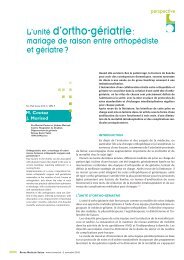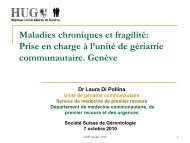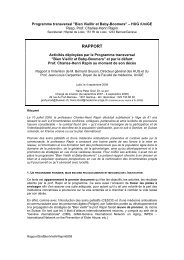Palliative care for older people - World Health Organization ...
Palliative care for older people - World Health Organization ...
Palliative care for older people - World Health Organization ...
You also want an ePaper? Increase the reach of your titles
YUMPU automatically turns print PDFs into web optimized ePapers that Google loves.
Box 4.2. An interdisciplinary task <strong>for</strong>ce on palliative <strong>care</strong> in UkraineProgress has already been made on the development of hospices in Ukraine, and there are plans to developregional and national programmes, palliative <strong>care</strong> registers and additional training <strong>for</strong> doctors and nurses.Access to hospices is not based on prognosis or diagnosis, and they also <strong>care</strong> <strong>for</strong> long-stay <strong>older</strong> <strong>people</strong>. Aninterdisciplinary task <strong>for</strong>ce, including representatives from both government and nongovernmental organizations,has been created in Ukraine. It aims to raise public awareness of palliative <strong>care</strong> throughout society, to createpatient-centred health <strong>care</strong> and to develop palliative <strong>care</strong> legislation. There have been consultations withpatients and the general public along with educational events, such as press conferences and films and radiobroadcasts about patients’ rights and safety. Patient leader groups and in<strong>for</strong>mation and advisory services havebeen established. The task <strong>for</strong>ce has adopted an integrated approach towards planning and delivering palliative<strong>care</strong> by reaching out to regions in Ukraine, religious denominations and members of society. Collaboration is inplace with other European countries to facilitate the exchange of experience in palliative <strong>care</strong>. Partners includeFrance, Poland, the Republic of Moldova and Romania. The Ukrainian interdisciplinary task <strong>for</strong>ce shows thatpalliative <strong>care</strong> can be integrated into a national health <strong>care</strong> system (16).Source: personal communication, Viktor Serdiuk, All-Ukrainian Council <strong>for</strong> Patients’ Rights and Safety.Box 4.3. Humanists Union, a palliative <strong>care</strong> association in Tbilisi, Georgia<strong>Palliative</strong> <strong>care</strong> is a fairly new but rapidly developing discipline within the health <strong>care</strong> system in Georgia. Twonongovernmental organizations, the Cancer Prevention Centre and Humanists’ Union (17), coordinate palliative<strong>care</strong> services. Since palliative <strong>care</strong> emerged in public discussions in 1995, the traditional focus on cancer via theCancer Prevention Centre has gradually shifted to other incurable diseases (with services currently provided<strong>for</strong> inpatient <strong>care</strong> <strong>for</strong> <strong>people</strong> with cancer and HIV and <strong>for</strong> <strong>older</strong> <strong>people</strong> in the framework of the GeorgianHome Care Coalition); more educational programmes, enhanced awareness about symptom control and painmanagement and elaboration of the state policy on drug availability. Work is underway to create a nationalprogramme <strong>for</strong> palliative <strong>care</strong>. The state budget covers 70% of the cost of services.One main goal of the Humanists Union is to promote the development of a palliative <strong>care</strong> system and theimplementation of internationally approved bioethical standards to underpin the creation and success of amodern palliative <strong>care</strong> service in Georgia. The Association has partners, collaborators and supporters from a widerange of government and nongovernmental organizations and international institutions, including Georgia’sMinistry of <strong>Health</strong>, Labour and Social Affairs, the Parliament of Georgia, Tbilisi State Medical University, NationalSociety of the Red Cross, the mass media, San Diego Hospice, the Hungarian <strong>Palliative</strong> Care Association and theHospice Foundation.Significant steps have been taken to raise the awareness and standards of palliative <strong>care</strong>: developingeducational material (handbooks on palliative <strong>care</strong>) <strong>for</strong> medical students; initiating palliative <strong>care</strong> as a universitydiscipline; practical training of health <strong>care</strong> staff members; and creating a mobile team (home-based hospice)providing palliative <strong>care</strong> to <strong>people</strong> with incurable diseases at home.Sources: personal communications, Tamari Rukhadze, Humanists’ Union and Ioseb Abesadze, Cancer Prevention Centre, Tbilisi, Georgia.16
















